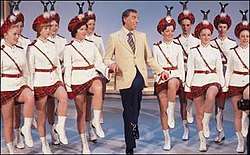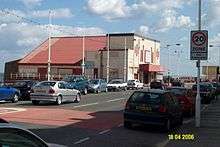Larry Grayson
Larry Grayson (31 August 1923 – 7 January 1995), born William Sulley White, was an English comedian and television presenter who was best known in the 1970s and early '80s. He is best remembered for hosting the BBC's popular series The Generation Game and for his high camp and English music hall humour.
| Larry Grayson | |
|---|---|
 Larry Grayson on The Generation Game | |
| Birth name | William Sulley White |
| Born | 31 August 1923 Banbury, Oxfordshire, England |
| Died | 7 January 1995 (aged 71) Nuneaton, Warwickshire, England |
| Medium | Comedian, television presenter |
| Years active | 1937-1995 |
| Notable works and roles | The Generation Game |
His camp stand-up act consisted mainly of anecdotes about a cast of imaginary friends; the most frequently mentioned were Everard and Slack Alice. He is often cited as one of the first gay entertainers to have enjoyed mass appeal, although he never made any reference to his sexuality. He was devoted to his adopted home town of Nuneaton, where a museum display relating to his life and work and a memorial have been established.
Biography
Grayson was born William Sulley White in Banbury, Oxfordshire, in 1923.[1] His parents were unmarried and he never met his father.[2] When Grayson was ten days old, his mother, Ethel White, arranged for him to be adopted by Alice and Jim Hammonds in Nuneaton, Warwickshire. He had two adoptive sisters, Flo and May. His adoptive mother Alice died when he was six years old, and he was brought up by his elder adoptive sister, Flo, with whom he lived for much of his life. It has been reported that his birth mother stayed in touch with the family and was known to Grayson as "Aunt Ethel", until he discovered her true identity when he was 8 years old.
Early career
Grayson left school at the age of 14 and began working professionally as a supporting drag act on the comedy club circuit.[1] He initially used the stage-name Billy Breen, but changed it to Larry Grayson in the 1950s on the advice of his agent.[2] BBC TV's The One Show reported on 27 November 2012 that the name "Grayson" was taken from the American singer Kathryn Grayson, but the origin of the name "Larry" is unknown.

Over the next 30 years he toured the UK in male revues and drag shows, as well as in variety shows at venues including working men's clubs, regional theatres and the Metropolitan in London.[2] He also added stand-up comedy to his act and developed a unique and very gentle anecdotal style of comedy. It was usually based around his various imaginary friends such as Everard, Apricot Lil, Slack Alice and the postman Pop-It-In Pete. A lot of his material was observational. In his early years, Grayson's family had the only telephone in the street, and his inspiration came from overhearing his neighbours using it. The "imaginary friends" were in fact based on local characters: for example, Apricot Lil worked at the local jam factory.[3]
It was while he performed as Billy Breen at the New Pavilion Theatre Redcar (now the Regent Cinema) that he started using his familiar catchphrase "shut that door" when a side door had been left open causing a cold breeze to blow across the stage straight from the sea.[4] During this period, Grayson was briefly managed by Eve Taylor, who renamed him 'Larry Grayson' and she is credited with being the source of the phrase, as several of her clients revealed that whenever she wanted to discuss money or personal issues with her clients, she would always tell them to "shut that door". Taylor struggled to find him the right opportunities and they parted, with Grayson becoming a client of Michael Grade.[5]
Television career
An early TV appearance in the 1950s had led to complaints about his act being too outrageous, and Grayson had resigned himself to a career off television. Then in the early 1970s his club act was seen by Michael Grade, then an agent, who quickly signed him.[6] Following several successful appearances in ATV variety shows, Grade's uncle, impresario Lew Grade gave Grayson a contract to front a show, Shut That Door! (1972), and slightly later, the Larry Grayson Show.[7][8]
In 1974 he released the Single ' Am I Just a Pretty Face ' , on Pye Records.[9]
Grayson also made two cameo appearances in the Midlands-based soap opera Crossroads, as a flouncing, difficult customer at the Crossroads Motel and as the chauffeur at the wedding of Meg Richardson, played by his close friend Noele Gordon.[10] In real life Grayson could not drive.[1] He also made a number of guest appearances in variety shows, chat shows and panel games.[11]
The Generation Game
Grayson's popularity peaked when he was hired by the BBC to present the Saturday night show The Generation Game in 1978, as replacement for Bruce Forsyth.[12] The show became hugely successful, attracting audiences of 25 million at its peak.[13] Grayson was assisted by his co-star Isla St Clair, whom he frequently referred to as "my lovely Isla".
Despite its huge popularity, by 1981 The Generation Game was being overtaken in the ratings by ITV's rival show Game for a Laugh. Grayson decided to leave The Generation Game in 1982 while it was still relatively successful, in the expectation that the BBC would offer him another high-profile Saturday night show; this did not materialise.
Later life
Because offers of work were not forthcoming, Grayson went into unintentional semi-retirement, enjoying time on his own at his house in Nuneaton with his beloved dogs, although he did return to television to present the game show Sweethearts for ITV in 1987.[2] He made a number of other TV appearances and radio broadcasts, especially on the Tom O'Connor hosted TV quiz show A Question of Entertainment, where he was one of the team captains in 1988.[14] Grayson moved with Flo (his adoptive older sister) to Torquay, Devon, as part of his semi-retirement, but moved back to Nuneaton after just a couple of years when he became bored and missed his close family and friends.[15] They lived in two separate neighbouring bungalows.[16]
Death
Grayson's final public appearance was on 3 December 1994 at the Royal Variety Performance.[2] During this performance he referred to his hiatus from television by commenting to the audience, "They thought I was dead!".
On New Year's Eve 1994, Grayson was rushed into hospital. He was found to have suffered from a perforated appendix. After being allowed home from hospital, Grayson died on 7 January 1995 in Nuneaton, at the age of 71. His body was buried alongside other members of his family at Oaston Road Cemetery in his home town of Nuneaton.[15]
Obituaries
Journalist Suzi Pritchard wrote in The Guardian:
"His camp, deliciously naughty humour was never crude or vulgar. The gentle ambivalence of his humour made him attractive to an extraordinarily diverse range of people. But his real appeal was that of a valued neighbour perceptively observing the details of everyday life and commenting on it across the garden fence, creating an emotional intimacy in a society starting to fragment."[17]
Ken Dodd, comedian, said of Grayson's appeal and warmth:
"He loved everybody and he wanted them to love him in return and yes, they did, they all loved Larry".[17]
Television appearances
- Camera One — 1956 — one of the acts in a televised variety show from the King's Theatre, Hammersmith.
- Saturday Variety — 1971 — television show appearances.
- The Leslie Crowther Show — 1971 — television show appearances.
- Saturday Variety — 1972 — television show appearances.
- Shut That Door! — 1972–74 — television show host.
- Crossroads — 1973 — guest appearance on the Boxing Day episode as an irate customer.
- . Sunday Night at the London Palladium - 1973 - television show appearances.
- The Larry Grayson Hour of Stars — 1974 — television show host.
- Look Who's Talking (1974) — television show appearances.
- The Larry Grayson Show (1975–77) — television show host.
- Crossroads — 1975 — guest appearance as the chauffeur of the wedding car in the episode when Meg married Hugh Mortimer.
- The Good Old Days- 1976-1983 – various appearances in televised music-hall variety show.
- Larry Grayson's Generation Game — 1978–82 — television game show host.
- At Home with Larry Grayson — 1983 — television show host.
- Late Night Larry — 1983 — radio music show host.
- Sweethearts — 1987 — television panel game host.[18]
- A Question of Entertainment — 1988 - Team Captain [19]
In 2009, Network DVD released a three disc set Shut That Door – Larry Grayson At ITV, which features material from his ITV days, including the one existing episode of his series Shut That Door and both series of The Larry Grayson Show.
References
- "Open That Door! – Larry Grayson's memoirs discovery reveals long-lost love". Birmingham City University.
- Anthony Hayward "Obituary: Larry Grayson", The Independent, 9 January 1995
- "Seems Like a Nice Boy!", Mike Malyon, 2016
- "this is Redcar & Cleveland History of the Regent Cinema". Redcar-cleveland.gov.uk. Archived from the original on 10 February 2017. Retrieved 23 January 2016.
- Nicholson, Tony (30 November 2017). Shut That Door!: The Definitive Biography of Larry Grayson. Kaleidoscope Publishing. ISBN 978-1900203647.
- "Famous People: Shut that door with Larry Grayson". BBC Coventry & Warwickshire. 24 September 2014.
- "BFI Screenonline: Grayson, Larry (1923-1995) Biography". www.screenonline.org.uk.
- "The Larry Grayson Show[31/10/75] (1975)". BFI.
- Malyon, Mike (25 July 2016). "Seems Like a Nice Boy: The Story of Larry Grayson's Rise to Stardom". Andrews UK Limited – via Google Books.
- Hicks, Danielle (3 November 2014). "Crossroads celebrates 50th anniversary". birminghammail.
- "Larry Grayson". BFI.
- "Larry Grayson's Generation Game[04/11/78] (1978)". BFI.
- Hogan, Michael (1 April 2018). "Why Larry Grayson is still the greatest game show host we've ever seen" – via www.telegraph.co.uk.
- "A Question of Entertainment[26/06/88] (1988)". BFI.
- Malyon, Mike (6 January 2015). "The door stays open as Larry Grayson's legacy continues". coventrytelegraph.
- Malyon, Mike (25 July 2016). "Seems Like a Nice Boy: The Story of Larry Grayson's Rise to Stardom". Andrews UK Limited – via Google Books.
- Pritchard, Suzi. "Obituaries from Suzi Pritchard and Ken Dodd]". BBC.co.uk. Archived from the original on 21 September 2010. Retrieved 18 April 2011.
- "Larry Grayson". Archived from the original on 20 April 2008. Retrieved 22 February 2008.
- "A Question of Entertainment - UKGameshows". Ukgameshows.com. Retrieved 21 December 2018.
External links
- Larry Grayson – h2g2, Look at the Muck on 'Ere! – Part One
- Larry Grayson – h2g2, Look at the Muck on 'Ere! – Part Two
- Larry Grayson – h2g2, Look at the Muck on 'Ere! – Part Three
- Knitting Circle – Larry Grayson biographical article
- BBC Coventry article – Shut that door with Larry Grayson
- Shut That Door! Larry Grayson at ITV, DVD review and biographical background
- Larry Grayson on IMDb
- The Larry Grayson Collection is held by the Victoria and Albert Museum Theatre and Performance Department.
- Larry Grayson at Find a Grave
- Larry Grayson at the BFI's Screenonline
| Preceded by Bruce Forsyth |
Host of The Generation Game 1978–82 |
Succeeded by Bruce Forsyth (in 1990) |